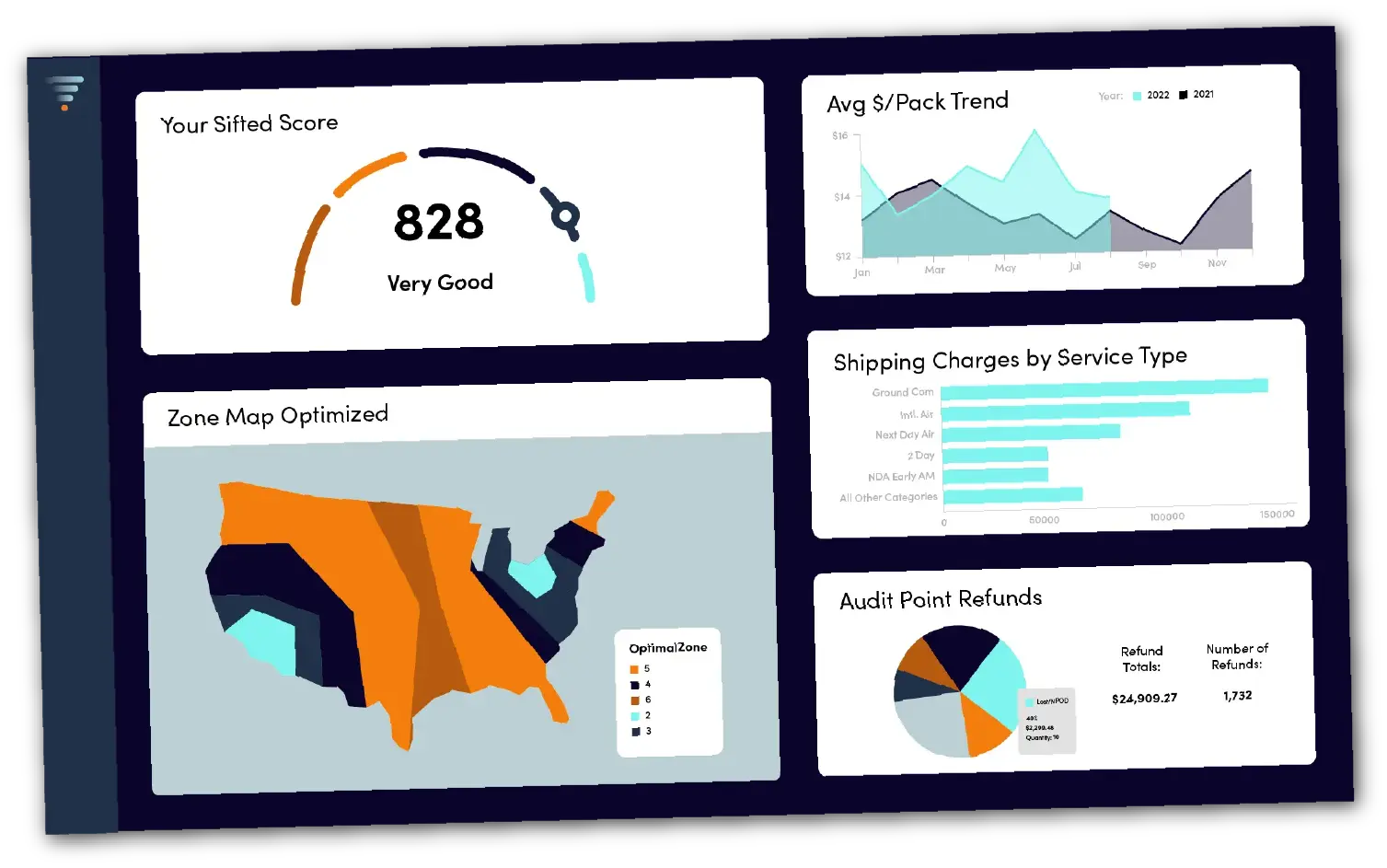What Is Carrier Management?
Carrier management is important for healthy operations and relationships between the shipper and the carrier. One of the ways to organize this is using by using Logistics Intelligence to help resolve challenges with obtaining the right carriers and monitoring their performance.
In addition, carrier management bridges the gap between the shipper and the carrier to ensure smoother movement of shipments. It helps businesses anticipate events and issues proactively to overcome obstacles and maximize successful outcomes.
In this article, we’ll discuss the importance of effective carrier management for shippers and review best practices and tools to help you measure carrier performance and reduce shipping costs.
Why Carrier Management is Important for Shippers
Here are several ways a carrier management system can help you improve your shipping and fulfillment operations:
- Monitor and benchmark carrier performance: If you utilize a multi-carrier strategy to fulfill customer orders, a carrier management system can help you seamlessly integrate carriers to track and compare their performance from a single place. It can also reveal important insights about shipping speed and costs. With this information, you can build and continuously improve your carrier network.
- Audit shipping invoices: Transportation spending accounts for 10% of your product’s cost. Errors and inaccuracies in shipping invoices can significantly hurt your profit margins. Effective carrier management helps you identify invoice discrepancies in fees and surcharges and share them with your carrier to request refunds for errors or failure to meet promised service delivery.
- Stay on top of shipping delays: 93% of customers want proactive updates from sellers about their orders. A carrier management tool lets you monitor all your delivery events from a central hub in real time and share tracking updates with your customers. This way, you can notify customers about potential delays in a timely manner and give them an estimate of when to expect their package.
Critical Functions of Carrier Management
Below, we’ll go over some of the best tools and metrics that can help you make the most out of your shipping operations.
Carrier Scorecards
Carrier scorecards can help shippers better understand their supply chain, offering greater visibility into their transportation operations and creating more accurate delivery estimates. Carrier scorecards give shippers a holistic view of their carrier performance and reflect compliance with the shipping contract.
The carrier landscape has changed in recent years. Shipping costs are rising, freight capacity is shrinking, and shipments are experiencing frequent delays. This doesn’t just affect the shippers, but it also hurts customer satisfaction as demand grows.
Although shippers don’t enjoy the same leverage they did in the past, carrier accountability to key metrics must be a cornerstone of any company’s eCommerce shipping strategy. Tracking logistics KPIs is vital to supply chain optimization, increasing revenues, and improving the bottom line.
A few of the KPIs that are measured include:
- On-time delivery performance
- Accurate invoicing
- Response time
- Customer service responsiveness
- Carrier capacity
- Carrier load preferences (such as full-truckload (FTL), less-than-truckload (LTL), small parcel, etc.)
- Carrier service levels
- Routing compliance
- Number of damage-free shipments
According to the 2021 MHI Annual Industry study, 31% of supply chain managers use prescriptive and predictive analytics to make their processes more efficient. Shippers can benefit from implementing carrier scorecard initiatives that apply predictive modeling to forecast challenges and determine solutions to overcome them.
Sifted Score uses machine learning (ML) algorithms to detect trends and anomalies in your shipping data. It measures the performance of your shipping operations across 20+ factors and summarizes them in a single score.
Shipping Volume Visibility Management
Carriers offer discounted pricing to shippers based on their volume of shipments. With shipping contracts, there are two main types of discounts: guaranteed and tier-based discounts (based on the average volume over the past 52 months).
Often, shipping companies don’t apply volume discounts by mistake. Furthermore, shipping carriers impose penalties when shippers divert shipping volume and fall below contractually pre-set levels. This means you must proactively track your shipping volume to ensure you don’t fall into a lower, more expensive tier. To achieve this, you’ll need to shift more volume to that carrier the next month to not lose your discount.
Sifted’s contract monitoring tool in the carrier management suite alerts shippers when they’re at risk of dropping below a volume threshold for discounts.
Carrier relationships are the backbone of your fulfillment operations. Shippers must closely examine their contract and pricing agreements and validate carrier invoices against negotiated rates and discounts to uncover discrepancies.

The #1 Logistics Intelligence Software
Claims Management
Managing claims properly is vital to the success of small and large-volume shippers. You must stay active throughout the claims process, from filing a claim early to staying in regular contact with the carrier and insurance company.
The process of filing claims, getting them approved, and appealing in the instance of rejection requires a lot of time and energy that many shippers do not have.
Nonetheless, FedEx and UPS provide a money-back guarantee for on-time deliveries and offer refunds if they fail to meet their promises. But they don’t always automatically give you these results.
A shipping audit assesses where you are being overcharged and uncovers service failures and non-compliance with contract terms.
While this is a time-consuming manual process, a shipping audit service like Sifted’s automated parcel audit can track potential refunds and file claims on your behalf!
Visibility Into Shipping Spend
Visibility into shipping spend can help shippers identify inefficiencies in logistics operations and identify the measures they can take to achieve the desired results. For example, Logistics Intelligence (LI) can compare actual shipping costs with the budget and identify a multi-carrier mix to yield low-cost transport alternatives.
Sifted logistics engineering allows you to model different contract terms and project how it would affect your overall cost for multiple carriers.
Choose Sifted’s Carrier Management Tools for Informed Decision-Making
A carrier management software (also known as a carrier management system) provides complete visibility over your shipping operations so you can plan ahead more effectively. It also helps you enforce rate compliance and ensures your own compliance across all your carriers to make informed business decisions.
Sifted’s Carrier Management Suite offers a complete way to streamline how you manage your carrier operations and contracts. Its contract monitoring and rate management features enable you to keep track of volume-based pricing penalties and alerts you, so you don’t fall within negotiated tiers.
Unlock discounts and reshape your carrier contracts using Sifted’s contract modeling software.











